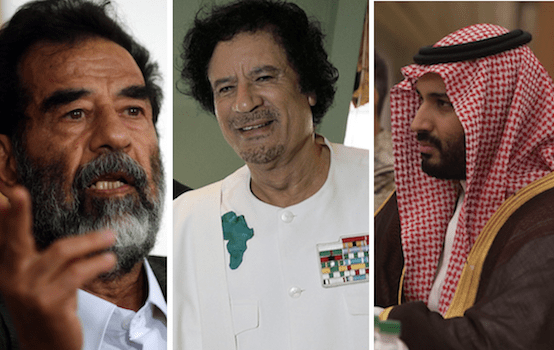Quincy: End U.S. ‘Domination’ of Middle East and Get Out

Time to get out.
No major foreign policy institution has really had the guts to say it before. But let’s be serious, very few voices in Washington’s national security elite actually believe there needs to be a significant withdrawal of American troop presence from the Middle East. If they do, they couch it pretty well.
The Quincy Institute for Responsible Statecraft, however, has decided that it’s time to shake off the euphemisms and tired fealty to the failed orthodoxies of the past. In a detailed report released today, the authors insist that it’s not only time to go, but they say the future of U.S. national security and regional stability relies upon it:
America’s military presence has caused the U.S. either to involve itself unduly in the region or be drawn into many strategically insignificant feuds and disputes. This policy of military domination has made Americans less safe, undermined U.S. standing abroad, and rendered America less prepared to respond to threats at home and to nonmilitary challenges such as pandemics and climate change. Nor has it served the peoples of the region.
Written by Quincy principles Paul Pillar, Andrew Bacevich, Annelle Sheline, and Trita Parsi, “A New U.S. Paradigm for the Middle East: Ending America’s Misguided Policy of Domination,” is a straightforward brief for dramatic change in our approach to the Middle East. For too long, they say, the case for militarism has relied on two planks: countering terrorism and protecting commerce (mainly oil). These arguments have become brittle and not only that, our extended troop presence and proclivity to get involved in other countries’ regional disputes in order to “protect our interests” has guaranteed we never leave when there might be an opportunity to do so: see Syria and Iraq.
While there is a legitimate interest in keeping Americans safe and maintaining the free flow of commerce, the scholars write, the U.S. has gone about it all the wrong way.
As the United States has overextended itself in the Middle East, geopolitical rivals in Moscow, Beijing, and Tehran have reaped the benefits of America’s strategic ineptitude. And even when the U.S. is not at war in the Middle East, Asian giants benefit from the American military protecting Middle East oil supplies on which the U.S. is ever less dependent. In summary, both security and economic concerns require a fundamental reorientation of U.S. policy in the Middle East, centered on a significant drawdown of America’s military presence in the region.
A new paradigm indeed. Quincy calls for reducing the footprint over 5 to 10 years and not make it dependent on conditions on the ground (otherwise we will never leave). They point out that aside from Turkey (a NATO country), the U.S. has no formal security agreements in the region and it should stay that way. They call for a new security architecture assisted but not led by the U.S., akin to the Organization for Security and Cooperation in Europe or the Association of Southeast Asian Nations, “while maintaining an offshore military presence that allows for intervention if necessary to protect the United States.”
Importantly, we must forget about showing favoritism and refusing to talk to adversaries. We need to normalize relations with Iran, get out of Yemen, end attempts at regime change in Syria, and stop condoning the bad behavior of our so called friends, like Saudi Arabia.
…Overt U.S. backing of the Saudi regime has often encouraged greater belligerence than when the Saudis have been less sure that the U.S. would intervene on their behalf. Unquestioned U.S. support for Israel has facilitated its continued occupation of Palestinian territory and reduced incentives to pursue a peaceful resolution of the conflict. A significant reduction of U.S. troops in the Middle East will help instill greater restraint and reduce the tendency toward destabilizing behavior among partner governments.
I cannot do the entire report justice, so read the whole thing. Quincy is promoting many of the goals that TAC has defended and projected for a long time. It is great to see these goals packaged, underscored with scholarship and with clear, unequivocal language about leaving the Middle East. We know Americans are tired of failed war policies and missions they no cannot clearly understand. There is no better time than now to do something about it.
Comments